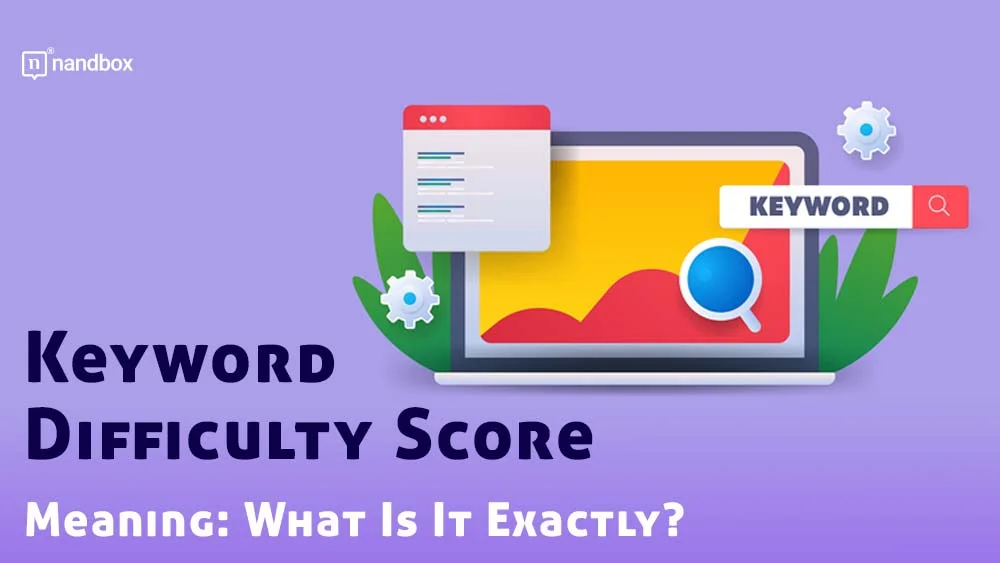In the ever-evolving realm of Search Engine Optimization (SEO), one concept that stands as a fundamental pillar of success is “Keyword Difficulty.” This comprehensive guide is designed to provide SEO beginners with a deep understanding of the concept known as “Keyword Difficulty Score Meaning.” In the dynamic realm of Search Engine Optimization (SEO), mastering Keyword Difficulty is fundamental for achieving higher search engine rankings and increasing organic traffic to your online assets. Within this meticulously crafted article, we will delve into the intricacies of Keyword Difficulty, offering you a detailed exploration of this essential SEO component. Whether you are embarking on your SEO journey or seeking to refine your expertise, this guide serves as an invaluable resource, equipping you with the knowledge and tools necessary to navigate and conquer the competitive landscape of online search effectively.
What Is Keyword Difficulty?
Keyword difficulty is the process of analyzing different keywords and determining to what extent it is difficult for a website to rank for them. It is also known as SEO difficulty, as keywords play a significant role in SEO and are a major part of many SEO optimization strategies like link building and guest posting.
Keyword research is considered the first step in any SEO optimization strategy. Through this research, website owners try to find the most relevant and useful keywords that they can target later. However, settling on and targeting keywords can’t be done without first assessing their difficulty.
How Is Keyword Difficulty Score Measured: The Full Meaning
So, how is keyword difficulty measured? It is a rather simple process, if you ask me. First, a website owner would do thorough research about the industry he is in. This research would help him analyze competitors and get a glimpse of the keywords they are using. The next step is finding keywords that are relevant to the scope of the website. Relevance alone is not enough; therefore, these keywords must also be useful, informative, and resonant so that users actually use them. After that, the website owner would find an SEO tool that has keyword research and analysis where he can take a look at all the keywords he has and also get a glimpse of the top keywords for each website.
What Will Appear to Any Website Owner Upon Searching for a Certain Website Is a Page Containing the Following:
- Keyword volume, which is the total number of searches conducted in one month for this keyword. The volume can be viewed globally or for certain regions and countries.
- Cost per click, which is the amount of money that an advertiser would pay for one click on an ad using this keyword.
- Lastly is KD, or keyword difficulty, which determines how hard it would be to rank using the said keyword. KD has a scale of 1 to 100, where each score means something. For instance, if a keyword scores from 1 to 14, it is very easy and wouldn’t take much effort to rank. From 15 to 29, it’s just easy. And although it is easy, it also needs good-quality content. 30 to 39 means it is possible to rank, but you need to put some effort into the content as it has to be well optimized. 50 to 69 is difficult, and 70 to 84 is very hard, which obviously requires much effort and implementing many SEO strategies like link building. Lastly, 85–100 is very hard; almost don’t even consider it unless you have superb content, matchless SEO tactics, and exceptional ranking.
Keep in mind that the score of keyword difficulty varies from one tool to another; the example above was according to the SEMrush KD score.
What Makes a Keyword Difficult? 4 Major Factors That You Should Keep an Eye On
Keywords weren’t born difficult; there must have been some factors that contributed to this. Certainly, there was. Among the many factors that may have contributed to keyword difficulty, 4 factors had the most impact.
Competitors
The first factor is competition. The more competitors in your industry target the same keyword, the more difficult it will be. Additionally, this also depends on the significance of the competitors and their standing in the market. For instance, it would be very difficult for a website to try to rank using a keyword that Facebook uses.
Domain and Page Authority
The domain and page authority of your page can impact the difficulty of your keywords and make them unattainable. Domain and page authority provide websites with many privileges, such as high-quality backlinks, more visibility, good traffic, and many more. In addition, they can also make difficult keywords easy for some websites. Since search engines trust highly authoritative websites with high DA, it would be easy for them to rank using keywords that are hard, possible, or even very hard. Of course, it would be as easy as pie to rank using easy or very easy keywords.
Keyword Difficulty Score Meaning: Quality of Content
Search engines always favor high-quality content for pretty much everything. Do you need to improve your domain authority? High-quality content. Want to gain organic super backlinks? High quality is the key. It is extremely important for your website to include some superb and optimized content, especially at the very beginning. As per keyword difficulty, websites with mid- or poor-quality content always face a problem ranking for nearly all keywords. That is because content is capable of making even the most difficult keywords easy, and vice versa.
Search Intent
Lastly, comes search intent. A search intent indicates the reason and purpose behind a search that a user makes. Google has a great system for understanding the search intent of each user query, which is divided into four main categories. The categories are informative, commercial, transactional, and navigational Each one has its own meaning and purpose; for instance, navigational intent means that a user knows his destination and is going to a specific website. Search intent has a major impact on keyword difficulty, as commercial keywords are usually more difficult to rank than transactional ones. Each depends on the number of searches and traffic it gains daily.
8 Reasons Why Measuring Keyword Difficulty Score Meaning Is Important
Resource Allocation
Keyword difficulty analysis helps you allocate your resources wisely. It allows you to prioritize keywords that are achievable based on your current website’s authority and resources. High-difficulty keywords may require more time, effort, and investment, so you can make informed decisions about where to focus your efforts.
Competitive Analysis
Keyword difficulty metrics provide insights into the competitive landscape. You can assess how difficult it is to outrank your competitors for specific keywords and identify opportunities where competition is low, making it easier to gain visibility.
Content Strategy
Assessing the difficulty of your target keywords can influence your entire content strategy. You can tailor your keyword choices to reflect the credibility and authority of your content. It helps you generate content with a higher potential for success in search engines.
Traffic Potential
Keyword difficulty analysis can help you predict how much traffic you might earn from a good search engine ranking for a certain keyword. With this data in hand, you can more accurately measure the success of your SEO efforts and move towards applying more strategies.
ROI Assessment
The possible return on investment (ROI) for particular keywords can be determined after the difficulty of those keywords is understood. SEO planning plays a crucial role in identifying these challenges and opportunities. The planning and evaluation of the success of your SEO operations depend on this information, which ensures well-allocated resources.
Long-Term Planning

Analyzing the difficulty of certain keywords has long-term benefits as well. It’s useful for thinking about the future of your SEO approach. You can find keywords with room for improvement and focus on becoming the go-to expert in those areas.
Keyword Difficulty Score Meaning: Keyword Diversity
It’s important to have a wide variety of keywords in your strategy, and you can do that by analyzing their complexity and difficulty. This prevents you from concentrating too much on competitive keywords and promotes an overall stronger and broader strategy.
Content Optimization
Assessing the difficulty of your target keywords can help direct how you optimize your current content. You can find ways to boost the rankings of keyword-focused pages by making the appropriate on-page SEO modifications and making them more appealing and effective.
Tools for Analyzing Keyword Difficulty Score Meaning
For analyzing keyword difficulty score meaning, there are a lot of tools that are industry players and offer many advantages and features that would make the process effortless.
SEMrush is a renowned and comprehensive SEO tool that literally does everything from site audits to social media and content marketing. This tool has one of the largest and most accurate databases, which many users depend on significantly. Using the keyword overview, you can learn all about certain keywords, from volume to KD and many more.
Ahrefs is also one of the renowned players that you can trust when it comes to keyword analysis. Their keyword explorer provides you with everything you need and more. From traffic to potential to keyword ideas and suggestions, you will ensure that you will find a relevant keyword where you can rank easily.
Ubersuggest, a keyword research tool, is also one of many you should definitely give a try. What makes this tool special is that it gives you detailed insights about keywords, which websites use them the most, and its full timeline. It also provides you with alternatives for the keywords and content ideas.





